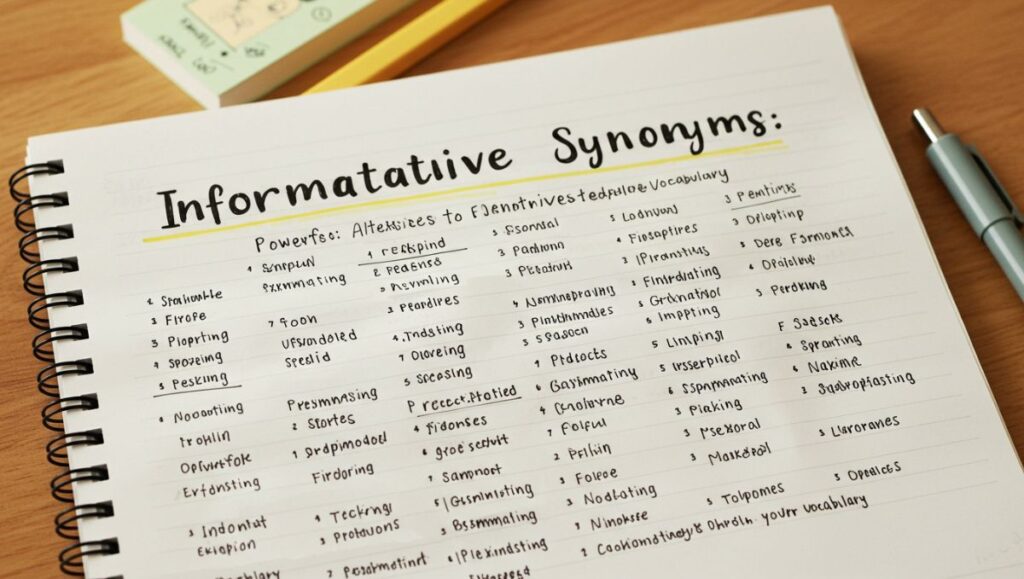Words are powerful tools that shape our thoughts, influence our emotions, and communicate our ideas. A strong vocabulary can open doors to better understanding and expression. But have you ever felt stuck using the same words over and over again? This is where informative synonyms come in handy. They not only add variety to your writing but also enhance clarity and depth.
Imagine transforming a simple sentence into something vivid and engaging by swapping out just one word. Whether you’re looking to impress in an academic essay or spice up your creative writing, knowing alternatives enriches your communication skills significantly. Let’s dive into the world of informative synonyms together and discover how they can elevate your language game!
Why is Having a Strong Vocabulary Important?
A strong vocabulary lies the foundation for effective communication. It empowers you to express thoughts with precision and clarity. When you articulate ideas clearly, your audience is more likely to engage and understand.
With an expansive word bank, you can convey nuances that simple terms often miss. This ability to choose the right words elevates conversations and written pieces alike.
Furthermore, a rich vocabulary boosts confidence. You feel more assured when speaking or writing because you know how to articulate your message effectively.
In personal relationships and professional settings, good language skills foster better connections. People are drawn to those who communicate well; it signals intelligence and awareness.
Having a robust vocabulary enhances critical thinking too. As you explore new words, you’re not just learning; you’re expanding your perspective on topics and ideas.
The Benefits of Using Synonyms
Using synonyms can significantly elevate your writing. They offer variety, making your text more engaging and dynamic. This keeps readers interested and enhances the overall reading experience.
Moreover, synonyms help avoid redundancy. Instead of repeating the same word, you can choose a different term that conveys a similar meaning. This not only improves clarity but also enriches your expression.
Synonyms also allow for greater precision in communication. Sometimes, one word may capture nuances that another cannot. Selecting the right synonym helps convey exactly what you intend to say.
Additionally, using diverse vocabulary reflects well on your knowledge and sophistication as a writer. It shows effort and care in crafting messages that resonate with an audience seeking depth in content.
How to Incorporate Informative Synonyms into Your Writing
Incorporating informative synonyms into your writing can elevate your expression and clarity. Start by identifying key terms in your text that may appear too frequently. This is where synonyms come in handy.
When you find a word that feels repetitive, consider its context. Explore alternatives using thesauruses or online tools designed for writers.
Once you have a list of potential substitutes, think about the nuances of each synonym. Some words might carry different connotations; select those that fit seamlessly with your tone.
As you revise, replace the original words with their synonyms while ensuring the overall meaning remains intact. Read aloud to catch any awkward phrases.
Don’t hesitate to experiment! Sometimes an unexpected choice can add flair to your prose and engage readers more effectively than plain vocabulary ever could.
Commonly Used Informative Synonyms and Their Meanings
Expanding your vocabulary with informative synonyms can elevate your writing. Here are some commonly used alternatives worth considering.
“Explain” can easily be replaced with “clarify.” While both words convey the same idea, “clarify” adds a touch of precision.
Instead of saying “important,” try using “significant.” This word carries a weight that can emphasize the importance of an issue or concept.
When you want to describe something as “helpful,” consider “beneficial.” It suggests not just assistance but also a positive outcome from that help.
For the term “show,” opt for “demonstrate.” This synonym indicates not only presentation but also proof or evidence supporting your claims.
Incorporating these variations enriches your language and engages readers more effectively. Embrace these changes and watch how they transform your writing style.
Tips for Choosing the Right Synonym
Choosing the right synonym can elevate your writing. Start by considering context. A synonym might have a similar meaning but could carry different connotations.
Next, think about your audience. What words resonate with them? Using familiar terms fosters connection and clarity.
Don’t forget about tone. Some synonyms are more formal or casual than others. Match the word choice to the mood you want to convey.
Consult a thesaurus, but use it wisely. Not every alternative fits seamlessly into your sentence structure.
Read aloud what you’ve written with the new synonym in place. This practice reveals if it feels natural or jarring within the text.
These strategies help ensure that each word enhances rather than detracts from your message.
Examples of Sentences Using Informative Synonyms
Using informative synonyms can dramatically enhance your writing. Here are some examples that illustrate their impact.
Instead of saying “The results were good,” you might say, “The outcomes were favorable.” This small change adds depth to the statement.
Consider a sentence like, “She explained the concept clearly.” You could elevate it by saying, “She elucidated the concept with clarity.”
For another example, rather than stating, “He made a suggestion,” try using “He proposed an idea.” It conveys more intention and nuance.
When discussing research findings, instead of simply declaring them as “new,” you could refer to them as “novel discoveries.” This choice sparks greater interest in your audience’s mind.
Each synonym carries its strength. Choosing wisely allows you to communicate more effectively and engagingly.
Conclusion
Building a strong vocabulary can significantly enhance your communication skills. Informative synonyms serve as powerful tools to help you express ideas more clearly and creatively. By incorporating these alternatives into your writing, you can engage readers and convey messages with greater precision.
The benefits of using synonyms extend beyond mere variety; they also enrich your language and make it more engaging. A well-chosen synonym can transform a dull sentence into something vibrant and lively.
As you practice selecting the right informative synonyms, keep in mind their nuances and connotations. Finding the perfect word not only reflects your understanding but also adds depth to your work.
Remember that learning new words is an ongoing journey. With time and effort, you’ll naturally expand your vocabulary while making every piece of writing shine brighter than before.







